10 Best SEO Keyword Research Tools in 2023
Search engine optimization (SEO) is a critical aspect of digital marketing, as it helps improve a website’s visibility in search engine results pages (SERPs). One of the most important steps in the SEO process is identifying the right keywords to target. Keyword research tools are essential tool for identifying the keywords that will drive the most traffic to your website.
However, it can be challenging to identify the right keyword for you article and there are many tools and SEO software that you can use to improve your SEO. That’s why we made a list of the best 10 best SEO keyword research tools in 2023!
What is SEO Keyword Research?
SEO keyword research is the process of identifying and analyzing keywords and phrases that potential customers use to search for products or services related to your business. The goal of SEO keyword research is to identify the keywords that will drive the most relevant traffic to your website, and to optimize your website’s content and structure to rank well for those keywords.
Keyword research involves several steps such as:
- Identifying the main topics that are relevant to your business
- Finding the most searched and relevant keywords related to those topics
- Analyzing the competition for those keywords
- Identifying long-tail keywords (longer, more specific phrases) that have lower competition
- Prioritizing the keywords to target based on their search volume, relevance and competition
- Incorporating those keywords into your website’s content and meta tags
By targeting the right keywords, you can increase your visibility in search engine results pages (SERPs), drive more targeted traffic to your website, and ultimately increase conversions and revenue.
Why is Keyword Research Important?
Keyword research is essential because it provides insight into the language people use when searching for products or services online. By identifying the most popular keywords related to your business, you can optimize your website’s content and increase its visibility on search engines. This, in turn, can help drive more traffic to your website, generate leads, and ultimately increase revenue.
10 Best SEO Keyword Research Tools in 2023
1. Google Keyword Planner
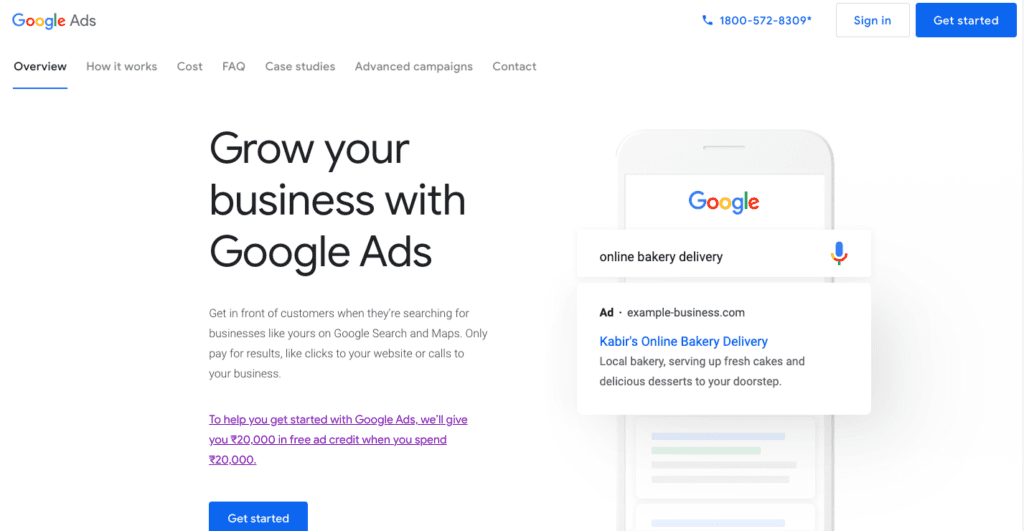
A free keyword research tool from Google is called Google Keyword Planner. It is a component of the Google Ads platform, although anybody may use it, regardless of whether they utilize Google Ads for their campaigns. It is intended to support companies, marketers, and website owners in their keyword research for SEO and PPC operations.
With Google Keyword Planner, you can:
- Search for terms relating to your company, product, or service to discover how frequently Google users are looking for them.
- Obtain historical data to analyze how a keyword has changed over time in terms of competitiveness, CPC (cost per click), search volume, and more.
- Create new keyword lists: You may create new keyword lists by combining various keywords or by utilizing the tool’s suggested keywords.
- Discover fresh keyword suggestions: You may look for new keywords relevant to your company, product, or service to see how they fare in terms of competitiveness and search traffic.
- Analyze your rivals: You may learn more about your rivals by examining the keywords that they are using in their advertising efforts.
With the help of Google Keyword Planner, you can discover which keywords are most often used by consumers and which are less difficult to rank for. You may use it to build a list of keywords that you can use to optimize the content of your website and the meta tags, as well as to help you find new keywords that you may not have thought of previously. This is a good tool for anyone because it is not complicated at all. You should try it out!
2. SEMrush
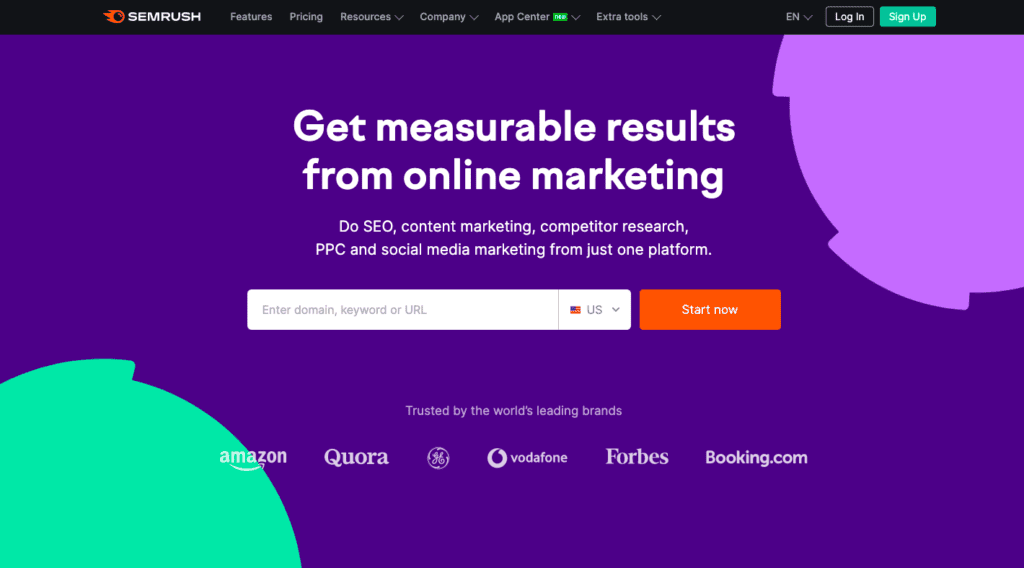
SEMrush is a complete digital marketing solution with tools for not only for keyword research, but also for SEO, PPC, content creation, and networking. Its ability to give in-depth research and insights about a website’s performance and rivals makes it a popular tool among digital marketers and website owners.
SEMrush main features include:
- Researching keywords with SEMrush will help you to see how they are doing in terms of search volume, CPC, and competition.
- Site assessment: This feature enables you to do a technical SEO audit of your website and find any technical problems that could be impairing your search engine rankings.
- Backlink analysis: It enables you to view the backlinks pointing to your website and the websites of your rivals and to assess the usefulness and quality of these connections.
- Researching your competition gives you the chance to find out how they are doing in terms of traffic, search engine rankings, and other factors.
- Organic research: It enables you to see the volume of organic search traffic coming to your website and the best content on the websites of your rivals.
SEMrush is an effective tool that gives you useful information about the performance of your website and the strategies used by your rivals. You may use it to assess where you stand in relation to your competition, find new keywords to target, and uncover any technical problems with your website.
Although it costs money, you may use the free version of the application or test it out for a while without paying anything. We have tried SEMrush and we loved it! This is highly recommended!
3. Ahrefs

Ahrefs is a complete digital marketing platform that offers a variety of functions for social media, SEO, PPC, and content marketing. It is an amazing tool for locating link-building possibilities and monitoring the success of your link-building initiatives and is well-known for its backlink analyzing skills.
Ahrefs main features include:
- Ahrefs’ keyword research tool lets you look up keywords to see how they are doing in terms of competitiveness, search volume, and CPC.
- Backlink analysis: It enables you to view the backlinks pointing to your website and the websites of your rivals and to assess the usefulness and quality of these connections. Additionally, it offers comprehensive metrics that may be used to assess the authority of a website, such as the Domain Rating (DR) and URL Rating (UR) of the connecting websites, which are Ahrefs-exclusive metrics.
- Site Explorer: With Ahrefs Site Explorer, you can view the top pages, top referring domains, and top organic search terms for any website, including your own.
- Ahrefs Articles Explorer enables you to find the most well-liked content on a specific subject and view the backlinks leading to it.
- Rank tracking: Ahrefs enables you to follow the evolution of your website’s position in search results for particular keywords.
Ahrefs is an effective tool that offers useful insights into the backlinks pointing to your website, those of your rivals, and the most well-liked material on a certain subject. Although it costs money, you may use it for a while without paying. SEO experts, digital marketing companies, and website owners that wish to raise their search engine ranks and increase traffic to their websites are the main users of it. Probably, this is the best SEO tool we have used before. It helps us grow a lot during the short period of time! You must start using it today!
4. Moz Keyword Explorer
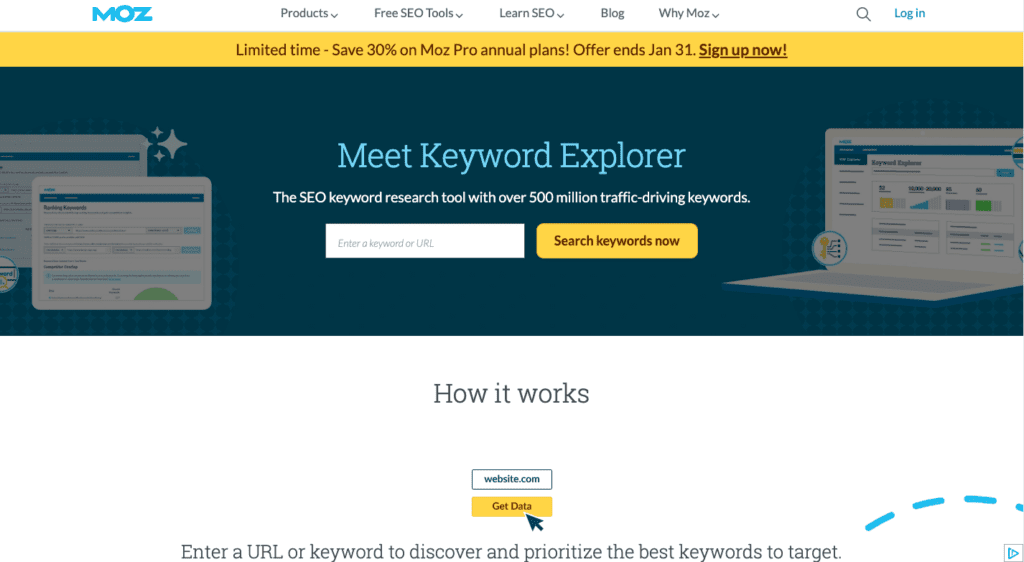
The SEO software and services provider Moz offers the keyword research tool Moz Keyword Explorer. It is made to assist companies, marketers, and website owners that are doing keyword research for SEO and PPC campaigns.
Moz Keyword Explorer allows you to:
- Search for terms relating to your company, product, or service to discover how frequently Google users are looking for them.
- Get historical data to examine how a keyword has changed over time in terms of competition, search volume, and CPC.
- Discover new keywords linked to your company, product, or service and analyze their search volume and level of competition to identify keyword opportunities.
- The keyword difficulty score provided by Moz Keyword Explorer goes from 0-100, with 100 being the most challenging. It considers the quantity and caliber of backlinks a page has.
The effective tool Moz Keyword Explorer may offer insightful information about which keywords are often searched for by users and which are less difficult to rank for. It gives you the opportunity to discover new keywords that you might not have previously thought of and offers a keyword difficulty score that can assist you in prioritizing which keywords to pursue. Although Moz Keyword Explorer is a premium tool, it offers a free trial and some features are also offered without charge. If you like other tools from Moz, you might want to use this!
5. Keywords Everywhere

Chrome or Firefox users can add the browser plugin Keywords Everywhere. It is a useful tool for swiftly choosing the best keywords to target since it enables you to examine search volume, CPC, and competition data for keywords immediately in the search results page.
With Keywords Everywhere, you can:
- View keyword search volume and CPC information across a variety of websites, including Google, YouTube, Amazon, Bing, and more.
- Find ideas for keywords as you write in the search box.
- View related search volume for terms.
- To comprehend patterns in search volume, see the data in a graph style.
- Viewing the top 10 websites for a term can help you analyze the competition.
The commercial edition of Keywords Everywhere includes extra features including historical data, greater search volume statistics, and the option to export the data to a CSV file in addition to the free version’s standard functionality. It’s a handy tool for rapidly determining the most effective keywords to target and may save you time by removing the need to visit several websites to get information. If you are using Chrome or Firefox, it might be a good tool for your SEO!
6. Ubersuggest
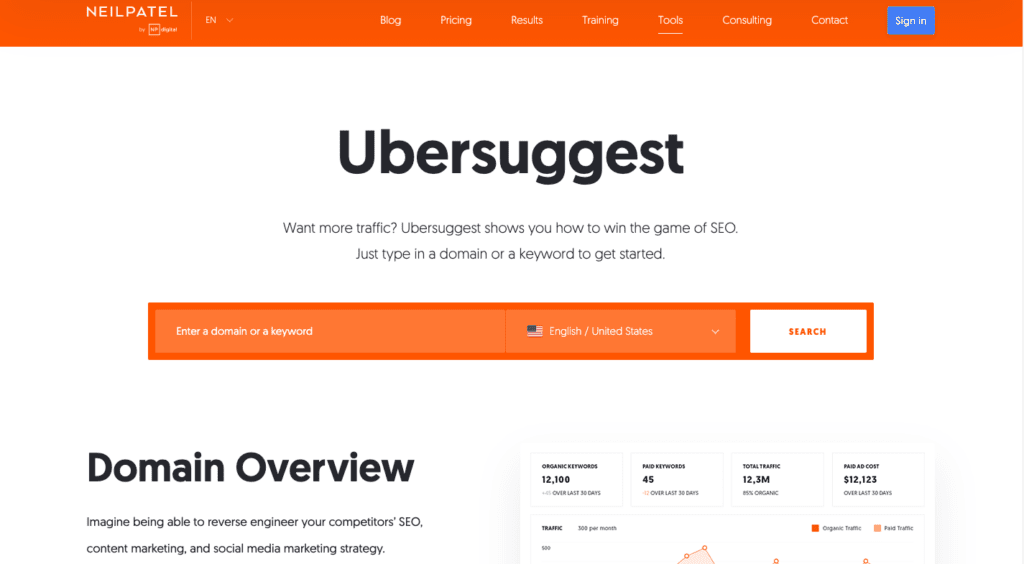
Neil Patel, a well-known digital marketer and entrepreneur, offers the free keyword research tool Ubersuggest. Researching keywords for SEO and PPC campaigns is made possible for companies, marketers, and website owners.
With Ubersuggest, you can:
- Research keywords: You may use Google to look for popular search terms for your company, product, or service.
- Obtain historical data to understand how a keyword has evolved in terms of search volume, CPC, and competition.
- Obtain keyword suggestions: By combining various keywords, you may create new lists of keywords. You can also use the tool’s suggested keywords.
- Check out the top 10 websites that are ranking for a certain term, together with information on their traffic and backlinks, to analyze the competition.
- Analyze your website’s performance to find out which organic keywords, backlinks, and traffic sources are most effective.
Ubersuggest is a free keyword research tool that is excellent for small businesses and website owners and offers insightful information on which terms are popular with visitors. It gives you a thorough picture of the performance of your website as well as the actions of your rivals and enables you to find new keywords that you may not have previously thought about.
7. Keyword Tool
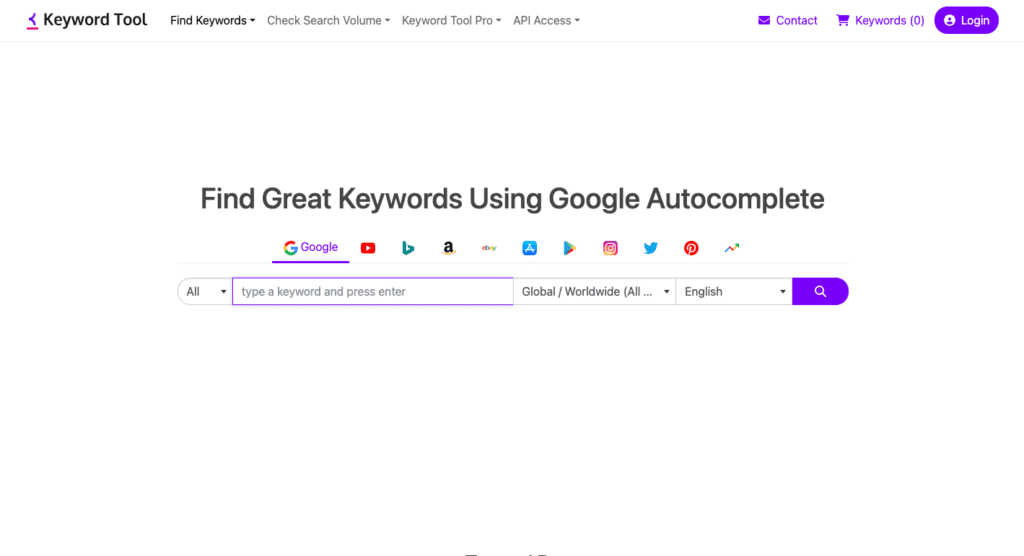
A list of associated keywords and phrases is produced by the free keyword research tool Keyword Tool using a seed keyword. It aids in the keyword research process for companies, marketers, and website owners running SEO and PPC campaigns.
With Keyword Tool, you can:
- Research keywords: To create a list of similar terms and phrases for your company, product, or service, you may search for keywords linked to those topics.
- Get keyword recommendations: By combining various keywords or by using the tool’s suggestions, you may create new lists of keywords.
- Check the search volume for each term to do an analysis.
- Examine competitiveness: The degree of competition for each term is visible.
- Analyze the trends to understand how a keyword has changed over time in terms of search volume, CPC, and competition.
- Investigate the keywords across many geographies and languages.
It’s simple to use, free, and ideal for small companies and website owners, Term Tool creates a list of similar words and phrases based on a seed keyword. It gives you a basic summary of the search volume and competitiveness for each term and enables you to find new keywords that you may not have thought of previously. Additional capabilities, including historical data, greater search volume data, and the option to export the data to a CSV file, are also included in the tool’s commercial edition. It would be a good fit if you use Youtube!
8. SERPstat
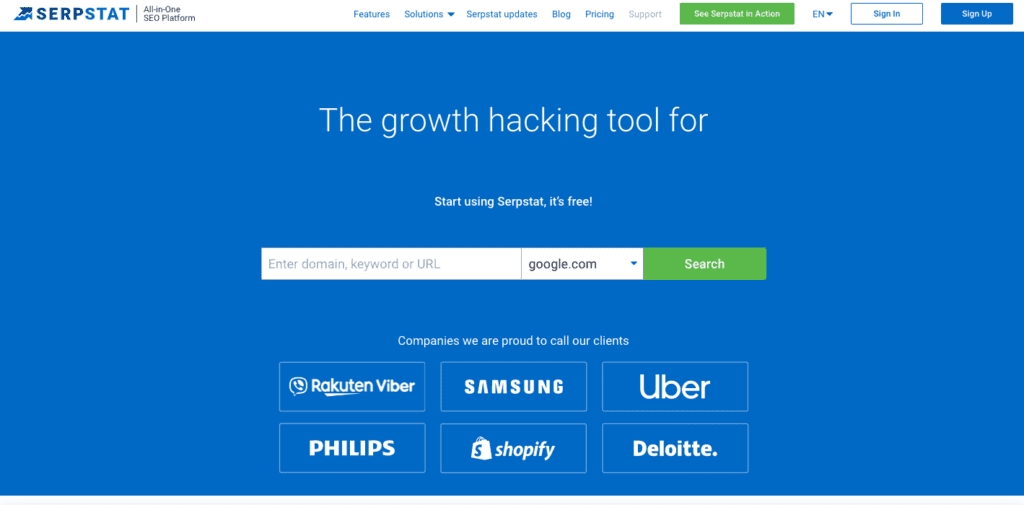
A complete digital marketing tool called SERPstat offers a variety of functions for social media, SEO, PPC, and content marketing. It is a potent tool for finding keyword prospects, monitoring the success of your SEO operations, and examining your competition. It is well renowned for its keyword research and site audit skills.
- Researching keywords using SERPstat will show you how they are doing in terms of search volume, CPC, and competition. Additionally, it offers ideas for relevant and long-tail keywords.
- Site audit: You may use it to do a technical SEO audit of your website and find any technical problems that might be preventing you from rising in the search engine results, such broken links and duplicate content.
- Backlink analysis: It enables you to view the backlinks pointing to your website and the websites of your rivals and to assess the usefulness and quality of these connections.
- Researching your competition gives you the chance to find out how they are doing in terms of traffic, search engine rankings, and other factors.
- PPC research: Using SERPstat, you can examine the PPC campaigns of your rivals and observe the keywords they are focusing on as well as their ad copy.
- Content analysis: SERPstat enables you to look at the backlinks going to the top-performing content for a specific term.
SERPstat is an effective tool that offers insightful information about the performance of your website, the actions of your rivals, and the most well-liked material on a certain subject. Although it costs money, you may use it for a while without paying. SEO experts, digital marketing companies, and website owners that wish to raise their search engine ranks and increase traffic to their websites are the main users of it.
9. KW Finder
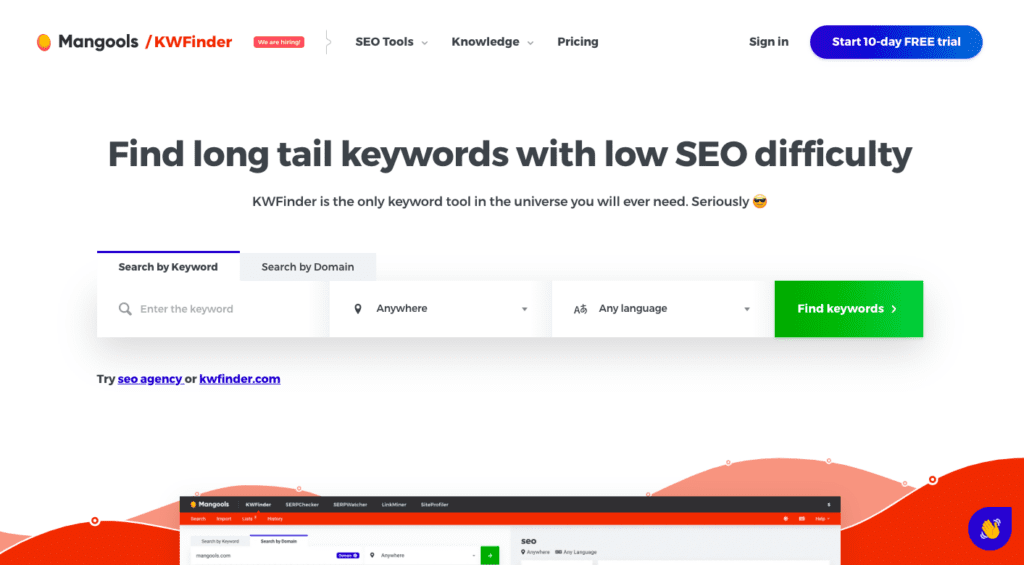
With the use of the keyword research tool KW Finder, companies, marketers, and website owners may find the best keywords for their SEO and PPC campaigns. It helps you to examine the competition for certain keywords and choose the best keywords to target.
With KW Finder, you can:
- Search for terms relating to your company, product, or service to discover how frequently Google users are looking for them.
- Get historical data to examine how a keyword has changed over time in terms of competition, search volume, and CPC.
- Discover new keywords linked to your company, product, or service and analyze their search volume and level of competition to identify keyword opportunities.
- Consider the keyword difficulty score provided by KW Finder, which goes from 0-100 with 100 being the most difficult. It considers the quantity and caliber of backlinks a page has.
- Get ideas for new keywords: You may create new keyword lists by combining various phrases or by utilizing the tool’s suggestions.
KW Finder is a potent tool that may offer insightful information about which keywords to target are less competitive and which are popular among users. It gives you the opportunity to discover new keywords that you might not have previously thought of and offers a keyword difficulty score that can assist you in prioritizing which keywords to pursue. Although KW Finder is a premium tool, it offers a free trial period and some features are also free.
10. Long Tail Pro

Long Tail Pro is a tool for finding keywords that businesses, marketers, and website owners may use in their SEO and PPC efforts. Long-tail keywords, which are longer, more precise phrases with less competition but the potential to deliver focused visitors to a website, are the focus of this tool’s research.
With Long Tail Pro, you can:
- Search for terms relating to your company, product, or service to discover how frequently Google users are looking for them.
- Get historical data to examine how a keyword has changed over time in terms of competition, search volume, and CPC.
- Identify chances for long-tail keywords: You may find new long-tail keywords that are relevant to your brand, product, or service and analyze their search volume and level of competition.
- Assessing keyword difficulty The keyword difficulty score offered by Long Tail Pro runs from 0-100, with 100 being the most challenging. It considers the quantity and caliber of backlinks a page has.
- Get ideas for new keywords: You may create new keyword lists by combining various phrases or by utilizing the tool’s suggestions.
- Consider your rivals: By examining the keywords that your rival is using in their advertising, you may conduct research on them.
Long Tail Pro is a potent tool that may offer insightful information about chances for long-tail keywords, it enables you to find new phrases that you might not have previously thought of, and it offers a keyword difficulty score that can help you decide which keywords to target first. Although Long Tail Pro costs money, it has a free trial period.
Effective Keyword Research Process
Keyword research can be a time-consuming process, but it’s worth the effort if done correctly. Here is a step-by-step guide on how to conduct effective keyword research:
Step 1: Brainstorm Potential Keywords
Start by generating a list of prospective keywords associated with your company or sector. Consider the goods or services you provide and the possible search terms your target market could use to find them. Use resources like Google Trends to help you find hot subjects and popular search keywords, for example.
Step 2: Conduct Keyword Research
Research prospective keywords to find out how popular and relevant they are once you’ve selected them. To examine search traffic, competition, and other crucial indicators, use tools for keyword research like Google Keyword Planner, SEMrush, or Ahrefs.
Step 3: Analyze Keyword Difficulty
How challenging it is to rank for a specific term is referred to as keyword difficulty. When selecting which keywords to target, keyword difficulty is a crucial factor. Keywords with high levels of competition could be difficult to rank for, while those with low levels of competition might not drive enough traffic. To assist you in making wise choices, tools like SEMrush and Ahrefs offer analytics on keyword difficulty.
Step 4: Consider Long-Tail Keywords
Long-tail keywords are more specific search queries that typically have lower search volume but higher conversion rates. Consider including long-tail keywords in your content strategy to attract more qualified leads.
Step 5: Analyze Competitor Keywords
Analyze your competitors’ websites to identify the keywords they’re ranking for. This can provide insight into their SEO strategy and help you identify potential keywords you may have overlooked.
Step 6: Create a Keyword Strategy
Create a keyword plan based on your keyword research that outlines the keywords you’ll target and how you’ll use them in the content of your website. Consider producing material that solves the problems and queries of your target audience. This can raise your website’s search engine ranks and establish it as a useful resource.
Summary
Keyword research is a crucial component of SEO and can help improve your website’s visibility and generate more qualified leads. By understanding your target audience and the language they use when searching for products or services online, you can create a keyword strategy that drives traffic and generates revenue.
Remember to consider keyword difficulty, long-tail keywords, and competitor keywords when conducting keyword research and developing a keyword strategy. With time and effort, effective keyword research can help improve your website’s search engine rankings and ultimately lead to business growth. Check out Ultimate Guide to Digital Marketing Strategies (2023)!
